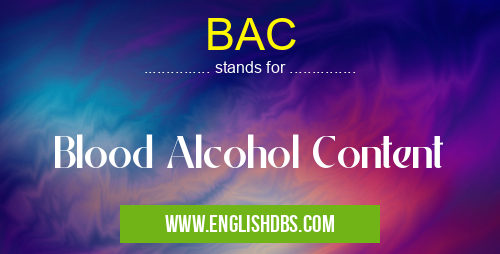What does BAC mean in HEALTHCARE
BAC (Blood Alcohol Content) refers to the measure of alcohol present in a person's bloodstream. It is commonly used by law enforcement and medical professionals to gauge the level of alcohol impairment. Understanding BAC is crucial for assessing the potential risks and consequences associated with alcohol consumption.

BAC meaning in Healthcare in Medical
BAC mostly used in an acronym Healthcare in Category Medical that means Blood Alcohol Content
Shorthand: BAC,
Full Form: Blood Alcohol Content
For more information of "Blood Alcohol Content", see the section below.
» Medical » Healthcare
Introduction: BAC - Blood Alcohol Content
How is BAC Measured?
BAC is typically measured using a breathalyzer or a blood test. The breathalyzer analyzes the alcohol content in a person's exhaled breath, while the blood test measures the alcohol content directly in the bloodstream. The results are usually expressed as a percentage, with 0.08% BAC being the legal limit for driving in most countries.
Factors Affecting BAC
Several factors can influence BAC, including:
- Amount and Type of Alcohol Consumed: The amount and type of alcohol consumed directly impact BAC. Hard liquors and fortified wines contain higher alcohol percentages, leading to a quicker increase in BAC.
- Body Weight: Individuals with a lower body weight tend to have a higher BAC than those with a higher body weight.
- Gender: Generally, women have a higher BAC than men when consuming the same amount of alcohol due to differences in body composition and enzyme activity.
- Metabolism: The rate at which the body metabolizes alcohol also affects BAC. Individuals with faster metabolisms break down alcohol more quickly, resulting in a lower BAC.
Effects of BAC
BAC can have varying effects on an individual depending on factors such as tolerance, age, and overall health. However, common effects include:
- Cognitive Impairment: Alcohol can impair judgment, coordination, and reaction time, increasing the risk of accidents.
- Physiological Effects: Alcohol can cause dehydration, nausea, vomiting, and increased heart rate.
- Long-Term Health Issues: Excessive alcohol consumption over time can lead to liver damage, heart disease, and other health problems.
Essential Questions and Answers on Blood Alcohol Content in "MEDICAL»HEALTHCARE"
What is Blood Alcohol Content (BAC)?
Blood Alcohol Content (BAC) is a measure of the amount of alcohol in a person's bloodstream, typically expressed as a percentage. It indicates the concentration of alcohol in the blood and is used to determine intoxication levels and the potential effects of alcohol on an individual.
How is BAC measured?
BAC is typically measured through a breathalyzer test, which analyzes the alcohol content in a person's breath. Breathalyzers are calibrated to provide an estimate of the BAC level in the blood. Alternative methods include blood or urine tests, which can offer more accurate measurements.
What factors affect BAC levels?
Factors that affect BAC levels include:
- Gender: Women generally have higher BAC levels than men for the same amount of alcohol consumed.
- Body weight: Heavier individuals have lower BAC levels than lighter individuals for the same amount of alcohol consumed.
- Metabolism: Individuals with faster metabolisms break down alcohol more quickly, resulting in lower BAC levels.
- Food intake: Consuming food before or while drinking alcohol can slow down alcohol absorption and reduce peak BAC levels.
What are the legal BAC limits?
Legal BAC limits vary by country and jurisdiction. In many places, the legal limit for driving is 0.08%. However, some jurisdictions have a lower legal limit, such as 0.05%.
What are the signs and symptoms of alcohol intoxication?
Signs and symptoms of alcohol intoxication can include:
- Impaired judgment and coordination
- Slurred speech
- Difficulty walking
- Confusion
- Nausea and vomiting
- Blackouts
Final Words: Understanding BAC is essential for responsible decision-making regarding alcohol consumption. By being aware of the factors that affect BAC and its potential consequences, individuals can make informed choices to minimize risks and protect their well-being.
BAC also stands for: |
|
| All stands for BAC |
